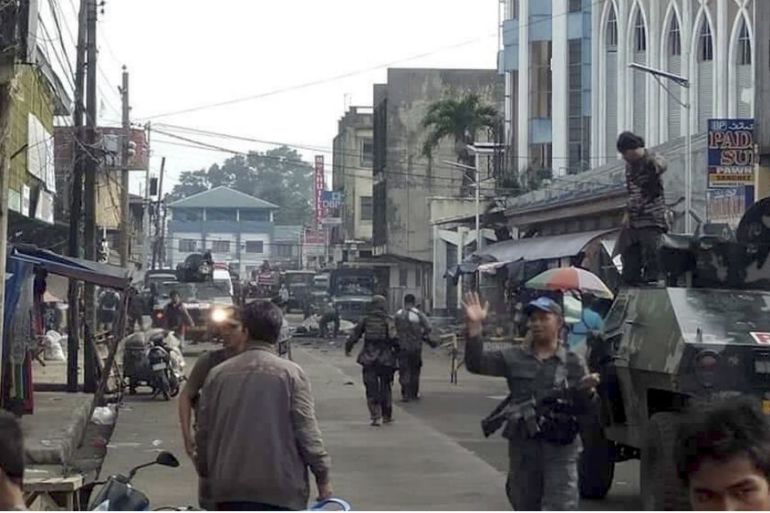Attacks undermine peace hopes in Philippines after historic vote
Mindanao voters gave emphatic support to autonomy to end decades-old conflict, but bombings risk return to violence.

Manila, Philippines – Back-to-back explosions at a Roman Catholic cathedral followed by a grenade attack on a mosque last week have swiftly ended the honeymoon for Filipinos celebrating the ratification of the Bangsamoro, a political agreement designed to end decades of violence in the southern Philippines by strengthening self-rule for the country’s Muslim minorities.
The referendum that confirmed the Bangsamoro took place on January 21.
Keep reading
list of 4 itemsPhilippine human rights campaigner granted bail
Families urge Philippines to work with ICC on ‘drug war’ probe
Philippine police officer jailed for killing teens in ‘drug war’
Six days later, the two bomb blasts at the church in Jolo town in Sulu province killed at least 21 people and wounded more than 100 others attending a Sunday service. Three days later, a grenade was thrown at a mosque in Zamboanga city in the middle of the night, killing two people and wounding four.
Sulu and Zamboanga are in the volatile and poverty-ridden Mindanao region in the southern Philippines, where Muslim rebels have been battling the government since the 1970s.
At least 120,000 people have been killed in the fighting.
‘Cowardly and evil’
The national government in Manila denied the attacks had anything to do with the referendum or its result.
But the Moro Islamic Liberation Front (MILF), which negotiated for the Bangsamoro and is expected to lay down its weapons to govern the area, says the incidents are a challenge to the peace agreement.
|
|
The Jolo bombing was “nothing but a cowardly and evil attempt to extinguish the hope for peace that we have in the newly ratified Bangsamoro Organic Law”, the group said in a statement.
“The forces of extremism, wherever they may be coming from, are bent to keep us in the cycle of violence, distrust and hatred that we want to put an end to,” it added.
Philippine authorities, although they initially downplayed a claim of responsibility by Islamic State of Iraq and the Levant (ISIL, also known as ISIS) group, suspect the Jolo cathedral attack was the work of an ISIL-linked faction of the Abu Sayyaf armed group.
The Abu Sayyaf, based in Sulu province, is a relatively small organisation notorious for bombings, beheadings and kidnap-for-ransom operations in the southern Philippines and the seas around Malaysia’s Sabah state.
Like the Front, the Abu Sayyaf is a splinter group from the original Moro National Liberation Front (MNLF), the first to rebel and fight the government for an independent state in Mindanao.
But unlike the Front and the MNLF, the Abu Sayyaf rejects autonomy.
It has also outdone both groups in terms of brutality, which is why the Abu Sayyaf is now widely regarded as mere bandits and pirates – rebels without a cause.
“You have the usual suspects, which is, of course, the Abu Sayyaf,” security analyst Jose Antonio Custodio told Al Jazeera. “But sometimes these groups do it upon the bidding of other groups that prefer to operate in the shadows.”
Sulu wants out
Aside from rebel groups, as in most parts of the Philippines, several political dynasties wield power in Mindanao. Some of these wealthy and influential clans are known to employ private armies or, in some cases, existing armed groups.
Among the provinces comprising an already existing autonomous region, Sulu is the only one where votes against the Bangsamoro exceeded those for it. Elsewhere in Mindanao, the “yes” vote won by a landslide.
|
|
However, the ratified law does not allow Sulu or any of the existing autonomous provinces to exclude themselves from the Bangsamoro; only those outside can opt in.
Sulu Governor Abdusakur Tan II has formally opposed the Bangsamoro, filing a case at the Supreme Court in October and insisting the autonomy law must include an option for exclusion.
Tan has also questioned the Bangsamoro’s form of government, arguing that the country’s constitution prohibits regional parliaments.
The planned Bangsamoro parliament will distribute power among political parties, district representatives and sectoral groups to diminish the power of the political clans whose feudal-style rule has left the region desperately poor.
‘All-out war’
Whichever groups were responsible for the attacks, the government has decided it’s the Abu Sayyaf they will pursue and punish.
President Rodrigo Duterte has ordered the military to wage an “all-out war” to “crush” the group.
Government forces have already resumed air attacks on suspected Abu Sayyaf hideouts in Sulu; the military’s preferred strategy when ground combat is hampered by the difficult and remote terrain.
Delfin Lorenzana, Duterte’s defence secretary, said it was difficult to fight the Abu Sayyaf because people in Sulu, whether out of fear or because they support them, were unlikely to reveal the fighters’ whereabouts.
Some local officials even protect the Abu Sayyaf, Lorenzana added.
A fresh wave of violence, it seems, is heaping more pressure on the Bangsamoro even before it has begun.